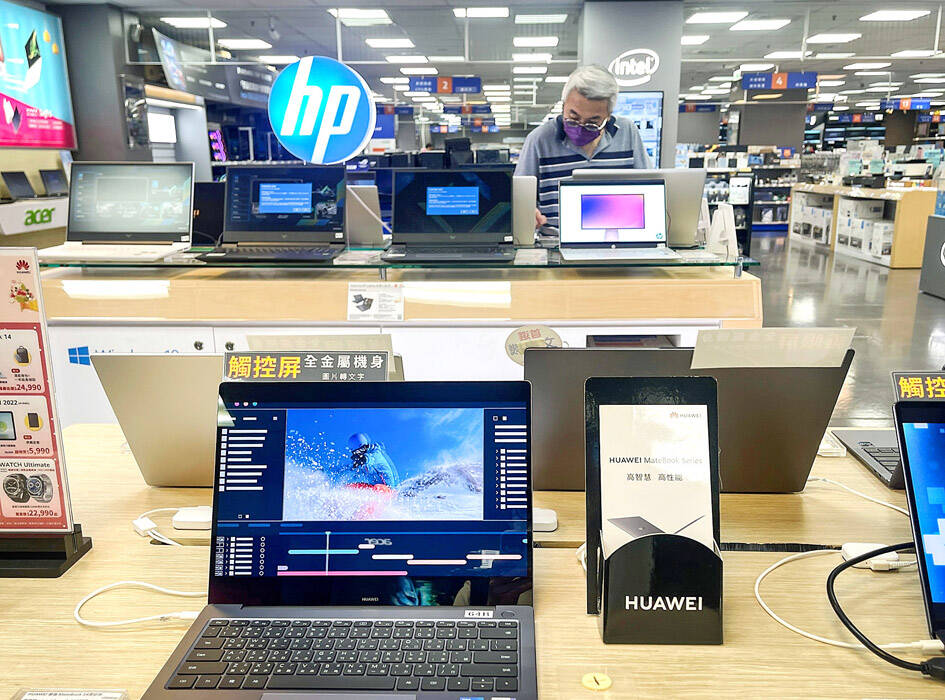The business climate monitor for the manufacturing industry turned “blue” in March, from a revised “yellow-blue” in February, as demand, selling prices and operating conditions weakened, the Taiwan Institute of Economic Research (TIER, 台灣經濟研究院) said yesterday.
The business composite index compiled by the Taipei-based think tank shed 0.56 points to 10.41, reflecting listless manufacturing activity, as global clients continued to adjust inventory amid poor sales.
TIER uses a five-color spectrum to capture the industry’s movements, with “red” indicating a boom, “green” suggesting steady growth and “blue” signifying a downturn. Dual colors indicate a transition to a better or worse condition.

Photo: CNA
Taiwan is home to the world’s leading suppliers of electronics used in smartphones, personal computers, wearables, TVs, vehicles and cloud computing.
A majority of local manufacturers, 51.75 percent, reported a decline in business, while 35.51 percent experienced a soft patch and 12.16 percent held steady, the institute’s monthly survey found.
None experienced a boom, it added.
The findings came even though firms in Taiwan and Asia emerged unscathed from bank failures in the US and Europe, TIER said.
The cost and input readings gained a meager 0.17 and 0.07 points respectively after the global economic slowdown cooled raw material prices and eased cost burdens, the institute said.
However, the gauges for demand, selling prices and overall operating conditions declined further, as inventory corrections dragged on, prompting local manufacturers to cut capacity to protect their margins.
For instance, petrochemical product suppliers opted to conduct annual equipment maintenance after outbound shipments and orders tumbled more than 30 percent from a year earlier, TIER said.
Plastic and rubber product makers saw business shrinking by a similar amount, despite the peak season starting, the institute said.
Tepid market demand in the US and Europe was to blame, but China added to the problem by cutting its dependence on one-off plastic products, it said.
Makers of textile products, while benefiting from rush orders in the wake of China’s reopening, saw sharper declines in production and business orders, as apparel brands turned conservative about inventory, it said.
Paper product vendors had a mixed showing, as a recovery in tourism and commerce boosted demand for shopping and packaging bags, but paper products for industrial use floundered, the institute said.
Vehicle sales picked up after chip shortages came to an end, enabling local suppliers of auto parts to report steady business growth, it said.

Vincent Wei led fellow Singaporean farmers around an empty Malaysian plot, laying out plans for a greenhouse and rows of leafy vegetables. What he pitched was not just space for crops, but a lifeline for growers struggling to make ends meet in a city-state with high prices and little vacant land. The future agriculture hub is part of a joint special economic zone launched last year by the two neighbors, expected to cost US$123 million and produce 10,000 tonnes of fresh produce annually. It is attracting Singaporean farmers with promises of cheaper land, labor and energy just over the border.

US actor Matthew McConaughey has filed recordings of his image and voice with US patent authorities to protect them from unauthorized usage by artificial intelligence (AI) platforms, a representative said earlier this week. Several video clips and audio recordings were registered by the commercial arm of the Just Keep Livin’ Foundation, a non-profit created by the Oscar-winning actor and his wife, Camila, according to the US Patent and Trademark Office database. Many artists are increasingly concerned about the uncontrolled use of their image via generative AI since the rollout of ChatGPT and other AI-powered tools. Several US states have adopted

A proposed billionaires’ tax in California has ignited a political uproar in Silicon Valley, with tech titans threatening to leave the state while California Governor Gavin Newsom of the Democratic Party maneuvers to defeat a levy that he fears would lead to an exodus of wealth. A technology mecca, California has more billionaires than any other US state — a few hundred, by some estimates. About half its personal income tax revenue, a financial backbone in the nearly US$350 billion budget, comes from the top 1 percent of earners. A large healthcare union is attempting to place a proposal before

KEEPING UP: The acquisition of a cleanroom in Taiwan would enable Micron to increase production in a market where demand continues to outpace supply, a Micron official said Micron Technology Inc has signed a letter of intent to buy a fabrication site in Taiwan from Powerchip Semiconductor Manufacturing Corp (力積電) for US$1.8 billion to expand its production of memory chips. Micron would take control of the P5 site in Miaoli County’s Tongluo Township (銅鑼) and plans to ramp up DRAM production in phases after the transaction closes in the second quarter, the company said in a statement on Saturday. The acquisition includes an existing 12 inch fab cleanroom of 27,871m2 and would further position Micron to address growing global demand for memory solutions, the company said. Micron expects the transaction to